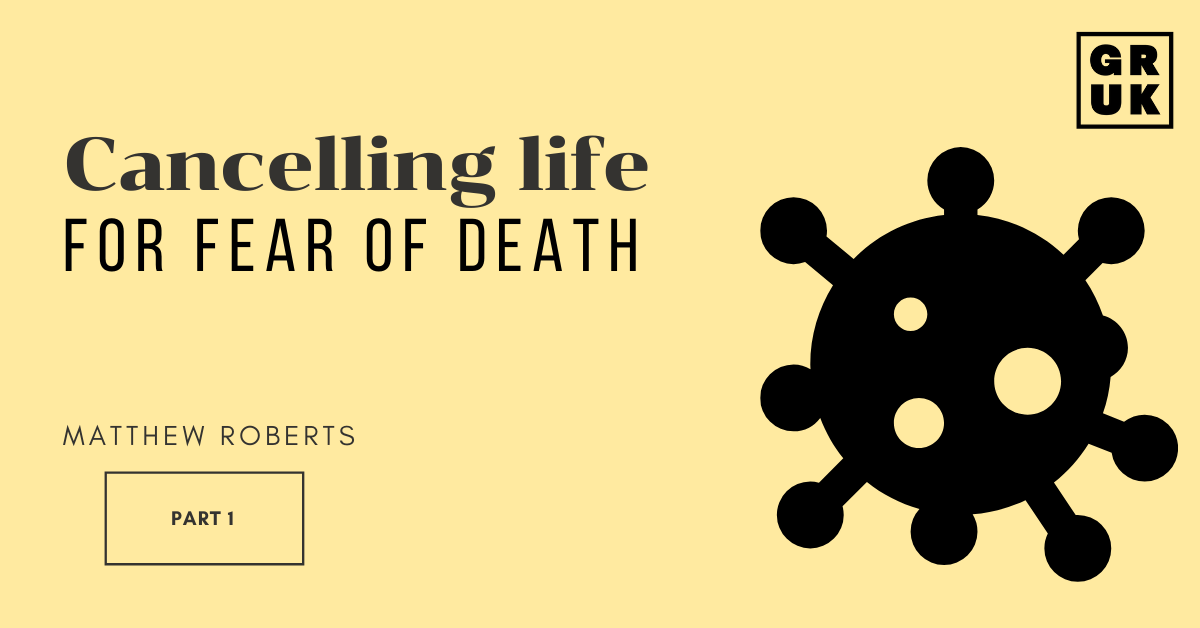Cancelling life for fear of death (2): Marriages
“Therefore a man shall leave his father and mother and hold fast to his wife, and the two shall become one flesh.” This mystery is profound, and I am saying that it refers to Christ and the church. (Ephesians 5:31-32)
Yesterday I wrote about how the Covid-19 lockdown has exposed an intense fear of death in British society– so intense that it seems that we will cancel anything, even the most important things in life, to avoid it. And I pointed to how Christianity gives hope beyond our own death, and so makes clinging on to this life that much less important; and, ironically, how this frees us up to receive and enjoy this life as a good gift from God. I want to look at three particular Christian ways in which God gives life in the face in the face of death; all of which have, ironically, been cancelled by Britain’s lockdown regulations. Today I consider marriages.
A wedding is all about the creation of future life. The vows made at a wedding are relentlessly and gloriously about the future: Will you love her, comfort her, honour and protect her, and forsaking all others, be faithful to her, as long as you both shall live?… I will. What God does at a wedding is a profound and wonderful mystery, the fusing of one man and one woman into one new family; a new united life of mutual unbreakable love which, thanks to what God has done on this day, will now begin to unfold.
And that mystery encompasses not just a new married life for this couple but the new life of the next generation, who will (barring the tragedy of infertility) be the God-given fruit of their God-given union. For the union of a man and a woman in marriage is the foundation of life for future generations. It is the means by which generations are bound together, in which this man and this woman submit the pleasures of the present to a commitment to the future. The two shall become one flesh, not only in the moment of consummation but in the bodies and lives of their children. Marriage, and marriage alone, is the secure context in which the next generation of humanity can be not only conceived but nurtured, shaped and taught to share the full riches of life by those whose bodies gave them life. Where marriage vows are honoured, the happy couple can hope to leave this life surrounded by grandchildren who carry forward their name, their character, their wisdom and their faith into a future long past their own day. Where marriage is despised, as tragically in Britain today, huge numbers will die not even knowing who their grandchildren are.
A marriage is, therefore, after baptism (which I shall consider tomorrow), the event in human society where life, a life which will outlive our own deaths, is most emphatically and powerfully given by God. Marriage declares that the presence of death in our midst need be no terror for us, for God will bring from this union generations to come to whom he will give the same life and show the same kindness as he has to us; that his promise to redeem and bless in Christ will stand firm and bear fruit for all of history to come. For most wonderfully of all, this future-focused celebration of life is a display to all mankind of God’s own purpose to redeem for his Son Jesus Christ a bride, the Christian church, with whom he will be united in a life of eternal fruitfulness. Marriage is God’s great, repeated, joyful declaration to all mankind that our race has a glorious future, which death can do nothing to prevent.
And yet for fear of death, marriages have been cancelled.
It seems that all our government thought they were doing when weddings were forbidden was banning parties; for that, of course, is all a wedding is to those who think that a marriage should be easier to get out of than a mobile phone contract, as parliament voted for yesterday. Now, such a glorious, life-giving event as marriage certainly merits the very best celebration that human life can organise. but the celebration is not the marriage. Banning parties was (probably) justified; banning marriages was not. To ban a party is disappointing, but to ban weddings is to ban the future, or at least any positive vision of and commitment to what the future might be. A society without marriages is a society without hope for the future or commitment to its children.
For huge numbers of engaged couples who, not being secular humanists, will not make the irresponsible move of simply living and sleeping together without first making vows before family, society and God, the banning of weddings has been totally unnecessary torment. Five people is all that is necessary for a wedding – the couple, two witness and the minister. Seven is better, so both sets of parents can attend. Only the couple themselves need venture within two metres of each other. At no stage has there been any justification for banning marriages on the grounds of risk of Covid-19 infection; the tiny risks involved are totally outweighed by the centrality of marriage to human life.
It is therefore, imperative that the British government permits marriages to take place once again without delay. To forbid the moment when God gives new life to a new family which will raise a new generation cannot be justified. Death is not such a terror that it is worth cancelling the very foundation of future life in order to avoid it.
It makes no sense to cancel life for fear of death.
Reposted from Matthew Roberts blog https://matthewpwroberts.wordpress.com/2020/06/09/cancelling-life-for-fear-of-death-2-marriages/
Matthew Roberts is the Minister of Trinity Church York, part of the International Presbyterian Church. http://trinitychurchyork.org.uk. You can find his musings on Twitter at @MPWRoberts.








